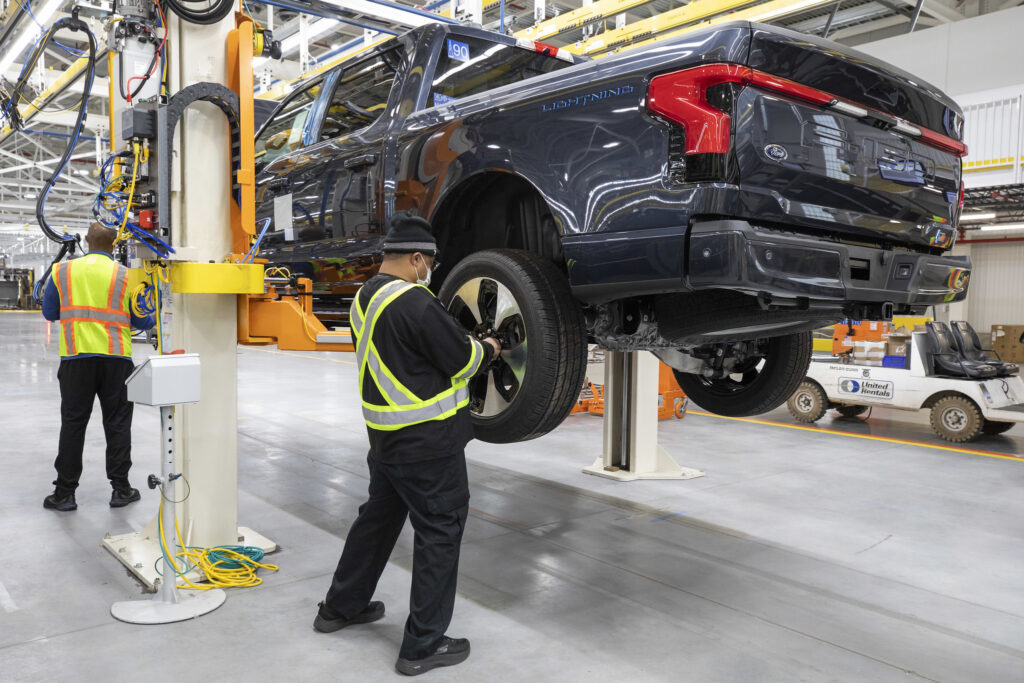Local Black elected leaders aligned with racial and economic justice groups want to build on the labor gains made through the United Auto Workers’ six-week strike. The union’s tentative deals with the big three automakers include major wins such as a 25% rise in pay and getting rid of the two-tier worker system.

More than 60 Black political leaders, many of them city council members and mayors and school board members in Washington D.C. and 20 states, including North Carolina, Tennessee, Georgia and Michigan, wrote President Joe Biden this week asking him to use his political power to push for higher standards in the rapidly growing electric vehicle industry. A few weeks ago, GM also agreed to cover electric vehicle battery manufacturing under the contract.
- RELATED: Ascend Elements, South Korean partners to build battery recycling facility in Hopkinsville
- RELATED: Two new industries will build plants in Hopkinsville and employ more than 700 workers
Biden, who spoke in support of the auto workers’ demands and marched in a UAW picket line during the strike, should continue to support changes in the industry, the letter says, by mediating conversations between workers, unions and automakers.
The elected officials say standards of compensation, safety and health for workers should be a priority for those talks. The Biden administration has made investments in electric vehicles a big priority in its economic agenda and has stated that the federal dollars spent on these investments will benefit workers and “expand high-paying manufacturing jobs” and help them “capture the economic benefits of the clean energy transition.” Nearly $1.7 billion in funding from Biden’s Bipartisan Infrastructure Law will be spent on electric buses, and organizers of the letter say they don’t want to see the money spent on plants that don’t provide good jobs for workers.
Advocates say these efforts are needed to protect Black auto workers in the South, where pay is often lower and unions are not as strong. All three major automakers have established or are building electric vehicle manufacturing plants and battery plants in Southern states, with many of the facilities being placed in rural, Black communities.
Erica Smiley, executive director of Jobs With Justice, said the Biden administration has acknowledged that it received the letter but Smiley and others are still waiting on next steps.
“I do think that there is some urgency in this moment for the administration to act, given the upcoming election and not just the presidential election itself but all the congressional elections and down-ballot elections that the Democrats would need to secure the House or even to make a dent,” Smiley said. “Certainly, Black mayors and local elected leaders and school board leaders signing a letter saying, ‘We don’t want to use federal dollars to exploit Southern workers, particularly Southern Black workers, is a powerful message to do that.’”
The majority of Black people live in the Southern U.S., at 56%, according to 2021 American Community Survey data. Bureau of Labor Statistics data shows that in 2022, 17.7% of workers in motor vehicles and motor vehicle equipment manufacturing were Black, and Black workers make up 19% of the Southern automaking region, an Economic Policy Institute’s analysis of 2016-2020 BLS data showed. The letter also stresses the importance of including Black workers in labor gains given the history of their exclusion from many of those gains.
“Moving jobs to the US South to exploit low labor costs built on a history of white supremacy is a pattern we have seen again and again,” the letter read.
Smiley said Democrats should be interested in ensuring that Black voters have enthusiasm to go to the polls and vote in the 2024 election.
“You applaud the victory in Detroit and assume that everything’s all said and done, but meanwhile, (if) they’re choosing between $17 an hour at McDonald’s and $16.50 at a local EV manufacturing place, they’re not going to feel really excited about that. They aren’t going to feel like you did a lot for them,” she said.
Yterenickia “YT” Bell, a member of the city council in Clarkston, Georgia, said she signed the letter because it’s a good opportunity to center the majority of her community, which is 64% Black. She added that Biden’s support can bolster unionization in a region of the country where it is often challenging to unionize.
“Regarding the EV supply chain plans, they don’t automatically unionize all of the plants, so there’s still a process with that and that’s a big fight. He showed up in the picket lines before and he needs to show them that he’s in this with them to get their wages and to have a voice,” Bell said.
Black people also bear the brunt of many of the effects of climate change, advocates say. One 2019 paper found that Black people breathe in 56% more particulate matter, or air pollution, than they are responsible for with personal consumption.
“[Biden] needs to be mindful that a lot of [Black people] in their communities have been disproportionately impacted by climate change and they’re not able to transition from one place to another. We need to be very mindful about how this industry comes into play when we talk about sustainable energy and that he needs to ensure that standards of the current agreement are the norm and not just an exception,” she said.
This article is republished under a Creative Commons license from Kentucky Lantern, which is part of States Newsroom, a network of news bureaus supported by grants and a coalition of donors as a 501c(3) public charity. Kentucky Lantern maintains editorial independence. Contact Editor Jamie Lucke for questions: info@kentuckylantern.com. Follow Kentucky Lantern on Facebook and Twitter.






